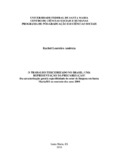| dc.creator | Andreta, Rachel Loureiro | |
| dc.date.accessioned | 2016-09-05 | |
| dc.date.available | 2016-09-05 | |
| dc.date.issued | 2016-03-30 | |
| dc.identifier.citation | ANDRETA, Rachel Loureiro. THIRD PARTY WORK: A REPRESENTATION OF THE PRECARIOUS FORMALITY?
From the general characterization to the specificity of the cleaning industry in Santa Maria / RS in the context of the 2000s. 2016. 209 f. Dissertação (Mestrado em Sociologia) - Universidade Federal de Santa Maria, Santa Maria, 2016. | por |
| dc.identifier.uri | http://repositorio.ufsm.br/handle/1/6270 | |
| dc.description.abstract | This study aimed to analyze the relation between the third party work regarding the cleaning industry and casualization. This study was carried out in the context of the 2000‟s during the PT federal governments. It was taken into consideration the increasing in the formal work that consequently increased the third party works during this period and; in sequence, it was made an attempt to understand if this type of work allowed an economic and social growth for the workers or if it improved their condition of vulnerability. To do so, this research was carried out in two moments: first, it was done a statistical and descriptive survey about the third party work in Brazil, especially regarding the city of Santa Maria/RS, in order to verify the location and extension of this phenomenon in the period of 2004 to 2014. Secondly, observations and interviews were carried out with workers from the third party cleaning industry in Santa Maria/RS, to analyze their work and life conditions. The collected data allowed us to identify that the third party work, regarding the cleaning industry, has casualization characteristics such as low payments, instability, no health insurance and workplace safety; third party workers are treated differently from the permanent ones; and there are impairment of the relations and the social invisibility happens as well. The third party work presents itself as a two-way street . Despite the negative effects and all vulnerability that it represents, it was observed that having a formal work register meant an advance to such workers because, the great majority, used to work informally or receiving a salary without any registration. Thus, it is understood that the third party work, in the 2000‟s during the PT federal governments, represents the precarious formality (SOUZA, 2012). In other words, in spite of being considered a formal work, the workers are submitted to precarious work conditions (which go beyond the labor market) and such conditions are disguised behind the so-called formal work register. | eng |
| dc.description.sponsorship | Coordenação de Aperfeiçoamento de Pessoal de Nível Superior | |
| dc.format | application/pdf | por |
| dc.language | por | por |
| dc.publisher | Universidade Federal de Santa Maria | por |
| dc.rights | Acesso Aberto | por |
| dc.subject | Terceirização | por |
| dc.subject | Precarização | por |
| dc.subject | Brasil dos anos 2000 | por |
| dc.subject | Third party work | eng |
| dc.subject | Casualization | eng |
| dc.subject | Brazil in the 2000‟s | eng |
| dc.title | Trabalho terceirizado: uma representação da formalidade precária? Da caracterização geral à especificidade do setor de limpeza em Santa Maria/RS no contexto dos anos 2000 | por |
| dc.title.alternative | Third party work: a representation of the precarious formality?From the general characterization to the specificity of the cleaning industry in Santa Maria/RS in the context of the 2000s | eng |
| dc.type | Dissertação | por |
| dc.description.resumo | Esse estudo buscou analisar a relação entre a terceirização no setor de limpeza e a precarização do trabalho. O contexto dessa pesquisa é o dos anos 2000, sob a égide dos governos federais do PT. Tendo em vista que, nesse período, houve crescimento do trabalho formal e isso acarretou, também, no aumento de postos de trabalho terceirizados, buscou-se compreender se esse tipo de trabalho permitiu crescimento econômico e social dos trabalhadores ou se retroalimentou sua condição de vulnerabilidade. Para tanto, essa pesquisa foi realizada em dois momentos: primeiramente, foi realizado um levantamento estatístico-descritivo da terceirização no Brasil, e particularmente, em Santa Maria/RS, para verificar a localização e extensão desse fenômeno no período de 2004 a 2014. Na sequência, foram realizadas observações e entrevistas com mulheres, funcionárias terceirizadas do setor de limpeza de Santa Maria/RS, para analisar suas condições de trabalho e vida. Os dados levantados permitiram identificar que o trabalho terceirizado, no setor de limpeza, possui características de precarização, tais como: baixa remuneração; instabilidade; desproteção quanto à saúde e segurança no trabalho; diferença de tratamento entre efetivos e terceirizados; enfraquecimento dos laços e invisibilidade social para os trabalhadores terceirizados. No entanto, o trabalho terceirizado mostrou-se uma via de mão dupla . Apesar de todos os seus efeitos negativos e de toda a vulnerabilidade que este representa, observou-se que a posse da carteira de trabalho significou um avanço para as trabalhadoras terceirizadas do setor da limpeza, que, em sua maioria, trabalhavam anteriormente como informais ou como assalariadas sem carteira assinada. Compreende-se, assim, que o trabalho terceirizado, no contexto dos anos 2000, sob a égide dos governos federais do PT, representa a formalidade precária (SOUZA, 2012). Isto é, ainda que seja um trabalho formal, os trabalhadores estão submetidos à condições precárias de trabalho (que refletem além da esfera laboral) e que se escondem por trás da carteira assinada. | por |
| dc.contributor.advisor1 | Campos, Rosana Soares | |
| dc.contributor.advisor1Lattes | http://lattes.cnpq.br/3832191347253241 | por |
| dc.contributor.referee1 | Martins, Cleber Ori Cuti | |
| dc.contributor.referee1Lattes | http://lattes.cnpq.br/2511629240909789 | por |
| dc.contributor.referee2 | Faria, Maria da Graça Druck de | |
| dc.contributor.referee2Lattes | http://lattes.cnpq.br/2748515666391074 | por |
| dc.creator.Lattes | http://lattes.cnpq.br/4788192442041839 | por |
| dc.publisher.country | BR | por |
| dc.publisher.department | Sociologia | por |
| dc.publisher.initials | UFSM | por |
| dc.publisher.program | Programa de Pós-Graduação em Ciências Sociais | por |
| dc.subject.cnpq | CNPQ::CIENCIAS HUMANAS::SOCIOLOGIA | por |


